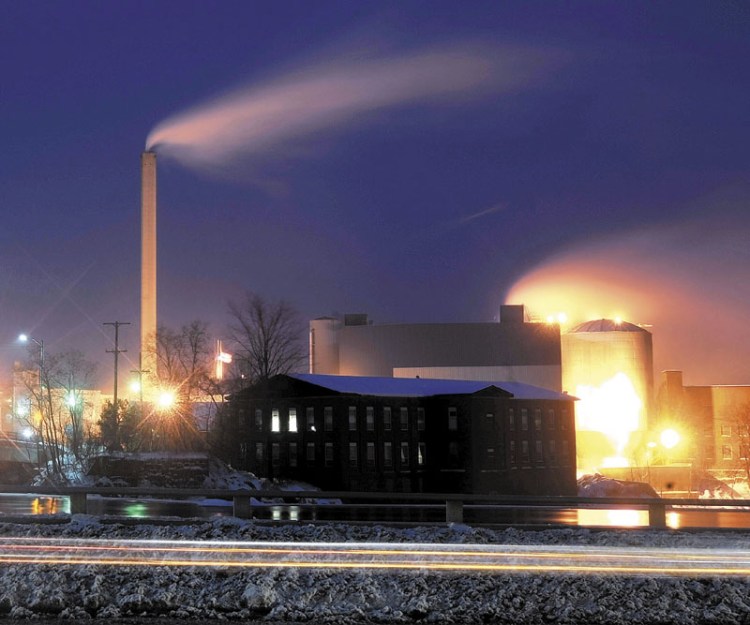MADISON — Madison Paper Industries will lay off an undetermined number of employees for at least two weeks starting this month during a short-term halt in paper production.
The news was disclosed Tuesday in a letter from the company’s president to Maine’s congressional delegation, citing competition from Canada’s Port Hawkesbury Paper and rising energy costs as challenges at the Madison mill. It follows a steep drop in the mill’s property tax valuation and growing concerns about the state’s paper industry.
“We regret having to take this downtime, but conditions in the U.S. market for supercalendered paper, combined with the increased energy costs we incur during the cold winter months, require us to reduce production,” Russ Drechsel, president of Madison Paper Industries, wrote in the letter.
The mill produces supercalendered paper, used for magazines and advertisements, and employs 220 to 230 people. Officials have not yet determined how many will be furloughed during the curtailment, which is scheduled to begin Jan. 24, Drechsel said.
For employees, the news was disappointing but did not come as a surprise.
“It’s just part of life. Paper mills are a dying breed, and unfortunately there’s nothing else coming to this area,” said Mike Derocle, 54, of Norridgewock, an employee of Madison Paper for 33 years. He said he plans to collect unemployment during the temporary shutdown.
This is the first time Madison Paper has shut down because of market conditions and energy costs, and officials aren’t sure how long the shutdown will last, although the letter estimated that normal production will resume around Feb. 9.
“It’s hard to estimate power prices and what the market will be doing. Typically in the summertime this isn’t something we would experience,” Drechsel said. “Whether it happens again next year or the year after, it’s hard to predict.”
In April, the mill finally connected to a new natural gas pipeline, following months of anticipation of expected savings on energy costs. The change has saved the company some money, but electricity prices remain high in New England, especially in the winter, Drechsel said. In addition, demand for natural gas in the winter often drives prices up.
The problem is that there isn’t enough pipeline in New England to carry natural gas, according to Tony Buxton, spokesman for the Coalition to Lower Energy Costs. When colder-than-normal temperatures hit, the price of natural gas rises to meet demand, which includes not just residences and businesses, but also natural gas-powered power plants and the electric grid. In 2013, New England ratepayers paid $3.6 billion more in energy costs than they would have if there had been enough pipeline in place to meet demand, according to the coalition.
“Madison is being affected by Canadian subsidies,” Buxton said. “On top of that, these energy costs are like pneumonia. It harvests people who are suffering from other problems.”
The Port Hawkesbury mill in Nova Scotia is one of just eight mills in North America producing the same type of paper as Madison Paper Industries, according to the Maine Pulp & Paper Association. About 1.8 million tons of supercalendered paper are purchased each year in North America but the market is declining, said Andrea Maker, spokeswoman for the organization.
Port Hawkesbury was closed by then-owner NewPage Corp. in 2011, but it reopened with the help of about $125 million in subsidies from the Canadian government in 2012. Since reopening, the mill has taken over about one-sixth of the market for supercalendered paper, Maker said. It produces about 360,000 tons of paper each year, while Madison produces about 200,000.
“With the subsidies, they have a much lower cost structure. It really does have a significant impact on other mills, including Madison,” Maker said. “When they were not operating, the supply and demand was just about in balance, but bringing on a major machine like Port Hawkesbury has done has disrupted the market, and Madison is feeling it now.”
Past efforts to put a stop to subsidies from the Canadian government to the Port Hawkesbury mill have been unsuccessful, according to Drechsel, who urged senators and representatives to put pressure on U.S. Secretary of Commerce Penny Pritzker, who oversees anti-subsidy laws.
Officials from Maine – including Gov. Paul LePage, who released a statement saying about 150 employees at Madison Paper would be affected – said they were troubled by the layoffs.
Copy the Story LinkSend questions/comments to the editors.




Success. Please wait for the page to reload. If the page does not reload within 5 seconds, please refresh the page.
Enter your email and password to access comments.
Hi, to comment on stories you must . This profile is in addition to your subscription and website login.
Already have a commenting profile? .
Invalid username/password.
Please check your email to confirm and complete your registration.
Only subscribers are eligible to post comments. Please subscribe or login first for digital access. Here’s why.
Use the form below to reset your password. When you've submitted your account email, we will send an email with a reset code.